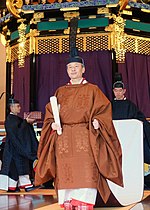Broadcast Research (in Japanese). 69 (7): 89. ISSN 0288-0008. "新元号「令和(れいわ)」 出典は万葉集" (in Japanese). 1 April 2019. Archived from the original on 4 April 2019...
38 KB (3,364 words) - 06:48, 27 May 2024
The Shinsen Man'yōshū (新撰万葉集, "Newly Compiled Man'yōshū"), also called the Kanke Man'yōshū (菅家万葉集, "Sugawara no Michizane's Man'yōshū"), is a privately...
3 KB (254 words) - 02:26, 9 February 2021
Japan reveals name of new era ahead of Emperor's abdication". "新元号は「令和」(れいわ) 万葉集典拠、国書由来は初". Asahi News Digital (in Japanese). 1 April 2019. Archived from...
90 KB (4,171 words) - 01:12, 8 May 2024
(『日本語の勝利』, "The Victory of Japanese"; Kodansha 1992) Shinjuku no Man'yōshū (『新宿の万葉集』, "Shinjuku's Man'yōshū"; Asahi Shimbun 1996) Aidentitiizu (『アイデンティティーズ』...
9 KB (893 words) - 21:59, 26 February 2024
value. Man'yōgana was initially used to record poetry, as in the Man'yōshū (万葉集), compiled sometime before 759, whence the writing system derives its name...
36 KB (4,202 words) - 20:01, 5 June 2024
Emperor. The earliest collection of these poems is known as the Man'yōshū (万葉集, "collection of 10,000 leaves"). This includes works by several remarkable...
32 KB (3,718 words) - 07:24, 1 May 2024
Tamil. References 広辞苑 第五版 p.2255 「人魂」 "写真で原典の該当ページを見ることが可能。京都大学附属図書館所蔵 重要文化財『万葉集(尼崎本)』pp.77-78". Archived from the original on 2016-03-03. Retrieved 2013-03-18...
7 KB (856 words) - 07:00, 4 April 2024
710–1185). It especially focuses on the place names from the Man'yōshū (万葉集) and the Fudoki (風土記). Nihon chimei gogen jiten (日本地名語源事典) Shinjinbutsu oraisha...
15 KB (1,674 words) - 22:55, 9 October 2023
Prince Furuhito-no-Ōe (古人大兄皇子). Her poetry is collected in the Man'yōshū (万葉集), the oldest existing collection of Japanese poetry believed to have been...
2 KB (113 words) - 04:29, 9 April 2024
Bountiful Harvests" or "Island of Bountiful Autumn"). The c. 600-759 Man'yōshū (万葉集, "Myriad Leaves Collection") transcribes various pieces of text using not...
30 KB (3,423 words) - 23:55, 26 May 2024
and Korean have words with the same meaning. In literature, Man'yōshū (万葉集 Man'yōshū, Collection of Ten Thousand Leaves) is the oldest existing, and...
39 KB (4,883 words) - 13:12, 3 June 2024
Japanese and Early Middle Japanese even for the same word. For example, 万葉集 is spelled in modern Japanese hiragana as まんようしゅう (man'yōshū), while in Early...
66 KB (4,885 words) - 11:43, 20 April 2024
actually kōryō/jiaolong ` flood dragon´, and correctly read as ` midzuchi´ 万葉集を按ずに.. 鮫龍即蛟龍也、宜しく美都知と訓ず". Minakata misquoted Norinaga, but Norinaga said chi...
24 KB (2,742 words) - 03:59, 2 June 2024
known as Princess Kagami was born. Kamochi Masazumi [ja]'s Man'yōshū Kogi (万葉集古義) speculates that she was the elder sister of Princess Nukata. She exchanged...
5 KB (254 words) - 02:52, 15 October 2023
name. (Iratsume means "young woman" or "daughter".) The Man'yōshū Kogi (万葉集古義) speculates that she was the daughter of Fujiwara no Maro and perhaps Ōtomo...
1 KB (99 words) - 16:11, 4 February 2023
Dazai no sochi) of the Dazaifu. Yūkichi Takeda's Man'yōshū Zenchūshaku (万葉集全註釈) speculates that he may have been the same person as the Ono no Tamori [ja]...
3 KB (152 words) - 08:08, 30 March 2021
in the service of Prince Toneri. Kamochi Masazumi [ja]'s Man'yōshū Kogi (万葉集古義) speculates that he was the same person as Hiketa no Kooji (引田朝臣子祖父 Hiketa...
5 KB (179 words) - 15:19, 27 September 2023
Man'yōshū Kajin Jiten 万葉集歌人事典 (in Japanese). Tokyo: Yuzankaku. p. 4. ISBN 978-4639019886. Nakanishi, Susumu (1983). "Man'yōshū (Kasū)" 万葉集【歌数】. Nihon Koten...
93 KB (1,989 words) - 23:10, 6 December 2023
alludes to it in the title. The earliest extant renga appears in the Manyoshu (万葉集), with its 5-7-5 mora jōku (上句 first stanza) written by Ōtomo no Yakamochi...
38 KB (5,361 words) - 20:44, 8 April 2024
Inaoka 1983, pp. 562–563. Hayashi, Tsutomu (1983). "Man'yōshū (Shohon)" 万葉集【諸本】. Nihon Koten Bungaku Daijiten 日本古典文学大辞典 (in Japanese). Vol. 5. Tokyo:...
5 KB (481 words) - 03:09, 24 October 2023
collected in several anthologies written during the 8th century: Man'yōshū (万葉集), in the fourteenth and twentieth volumes, as well as some poems from volume...
14 KB (1,349 words) - 12:35, 20 April 2024
Chinese scholar, followed Okada in his paper "Man'yōshū Shomei no Igi" (万葉集書名の意義, 1951, published in the first volume of the journal Man'yō), noting...
10 KB (1,031 words) - 16:43, 9 April 2021
OCLC 70216445.{{cite book}}: CS1 maint: others (link) Kishimoto, Yuzuru (1924). 万葉集攷証 第3巻(上). Kokonshoin (古今書院). 大夫. Daijirin, 2nd edition Daijisen, 1st edition...
6 KB (743 words) - 01:21, 25 March 2024
Kiichirō; Mori, Atsushi; Harihara, Takayuki (eds.). Man'yōshū Kajin Jiten 万葉集歌人事典 (in Japanese). Vol. 1. Tokyo: Yuzankaku. pp. 278–279. ISBN 978-4639019886...
8 KB (460 words) - 21:18, 12 July 2023
Wang Wei (王維, 699–759) Yi Xing (一行, 683–727) Japanese literature Man'yōshū (万葉集) compiled by Ōtomo no Yakamochi (大伴 家持) Kannada: see Rashtrakuta literature...
25 KB (2,295 words) - 22:50, 12 October 2023
to Keichū, a close friend. The result was the latter's Man'yō Daishōki (万葉集大匠記, 1687–1690), which had a profound effect on kokugaku scholarship. In particular...
4 KB (426 words) - 03:39, 29 October 2022
566–567. Hayashi 1983, p. 567. Hayashi, Tsutomu (1983). "Man'yōshū (Shohon)" 万葉集【諸本】. Nihon Koten Bungaku Daijiten 日本古典文学大辞典 (in Japanese). Vol. 5. Tokyo:...
13 KB (1,157 words) - 14:24, 26 December 2021
Year Winner(s) 1 Publisher 2 Notes 1979 Mr. Ian Hideo Levy for Man'yōshū (万葉集) and Prof. Robert Epp for Poetry by Kinoshita by Yuji Kinoshita Princeton...
12 KB (275 words) - 21:20, 9 March 2024
Yomiuri Shinbunsha, 1985. Onna (女), Tokyo : Sakuhinsha, 1987. Manʾyōshu (万葉集), Tokyo : Kōdansha, 1989. Kaoru ki no uta : haha to musume no ōfuku shokan...
3 KB (365 words) - 10:44, 13 April 2024











